
Clarke Abel was a British surgeon and naturalist. The standard author abbreviation C. Abel is used to indicate this person as the author when citing a botanical name.
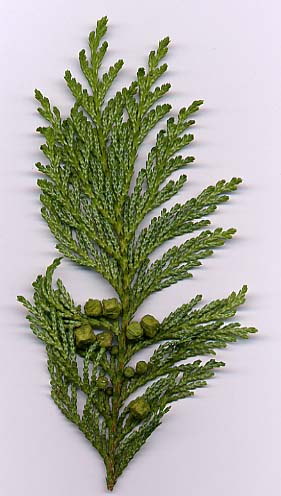
Chamaecyparis, common names cypress or false cypress, is a genus of conifers in the cypress family Cupressaceae, native to eastern Asia and to the western and eastern margins of the United States. The name is derived from the Greek khamai (χαμαί), meaning "on the earth", and kuparissos (κυπάρισσος) for "cypress".

Abelia is a genus of flowering plants in the honeysuckle family, Caprifoliaceae. The genus currently includes six species native to China, Taiwan, and Vietnam.

Phyllostachys is a genus of Asian bamboo in the grass family. Many of the species are found in central and southern China, with a few species in northern Indochina and in the Himalayas. Some of the species have become naturalized in parts of Asia, Australia, the Americas, and southern Europe.
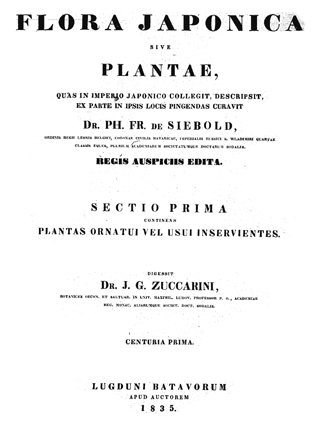
Joseph Gerhard Zuccarini was a German botanist, Professor of Botany at the University of Munich. He worked extensively with Philipp Franz von Siebold, assisting in describing his collections from Japan, but also described plants discovered in other areas, including Mexico. Siebold wrote his Flora Japonica in collaboration with Zuccarini. It first appeared in 1835, but the work was not completed until after his death, finished in 1870 by F. A. W. Miquel (1811–1871), director of the Rijksherbarium in Leiden.

Weigela is a genus of between six and 38 species of deciduous shrubs in the family Caprifoliaceae, growing to 1–5 m (3–15′) tall. All are natives of eastern Asia. The genus is named after the German scientist Christian Ehrenfried Weigel.
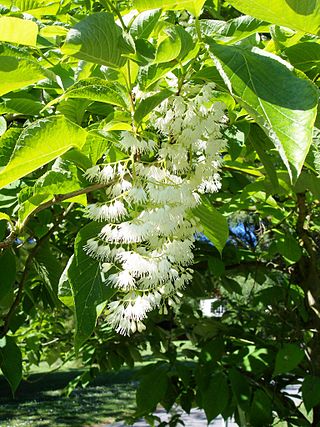
Pterostyrax, the epaulette tree, is a small genus of four species of deciduous large shrubs or small trees in the family Styracaceae, native to eastern Asia in China and Japan. They grow 4–12 m (13–39 ft) tall, with alternate, simple ovate leaves 6–17 cm (2–7 in) long and 4–10 cm (2–4 in) broad. The flowers are white, produced in dense panicles 8–25 cm (3–10 in) long. The fruit is an oblong dry drupe, with longitudinal ribs or narrow wings.

The Styracaceae are a small family of flowering plants in the order Ericales, containing 12 genera and about 160 species of trees and shrubs. The family occurs in warm temperate and subtropical regions of the Northern Hemisphere.

Triadica is a plant genus of the family Euphorbiaceae first described as a genus in 1790. It is native to eastern southeastern, and southern Asia.

Actinidia arguta, the hardy kiwi, is a perennial vine native to Japan, Korea, Northern China, and the Russian Far East. It produces a small kiwifruit without the hair-like fiber covering the outside, unlike most other species of the genus.

Gamblea is a genus of plants of the family Araliaceae, comprising four species. It originally comprised a single species, Gamblea ciliata, which is found in India.

Picea polita, synonym Picea torano, commonly known as the tigertail spruce, is a species of conifer in the family Pinaceae. It is native to Japan.
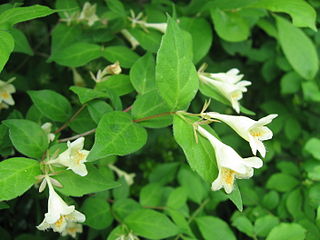
Diabelia spathulata, synonym Abelia spathulata, is a species of flowering plant in the honeysuckle family (Caprifoliaceae). It is a shrub native to southern Korea and central and southern Japan.

Paederota is a genus of flowering plants in the family Plantaginaceae. It has only one species, Paederota bonarota, which grows only on dolomite in the Alps of Italy, Austria and Slovenia.

Acer distylum, the lime-leaved maple or linden leaved maple, is a species of flowering plant in the family Sapindaceae, native to north Honshu Island of Japan. Its closest relative is Acer nipponicum, with which it is grouped in the Acer section Parviflora. The species is noted for its 10–15 cm (4–6 in) unlobed leaves, the like of which are not found in any other maple species. The bark is grayish, and has a pink cast in young specimens. Acer distylum was first described by Philipp Franz von Siebold and Joseph Gerhard Zuccarini in 1845, and later brought to Europe by Charles Maries in 1879.
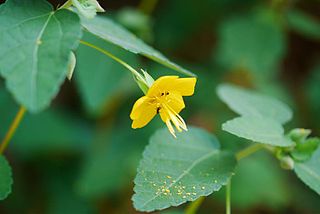
Corchoropsis is a genus of flowering plants belonging to the family Malvaceae. It contains three species native to eastern Asia, which range from Myanmar and Thailand through China to Korea and Japan. Two species, C. burmanica and C. sinensis, are shrubs or small trees, and C. crenata is an annual.

Meliosma rigida, the stiff-leaved meliosma, is a species of flowering plant in the family Sabiaceae. It is native to Laos, Vietnam, southern China, Taiwan, Japan, the Ryukyu Islands, and the Philippines.
Schizocodon is a genus of flowering plants belonging to the family Diapensiaceae.

Wisteriopsis japonica is a species of flowering plant in the family Fabaceae, native to Japan, Korea, and the Ryukyu Islands. It was first described in 1839 as Wisteria japonica.
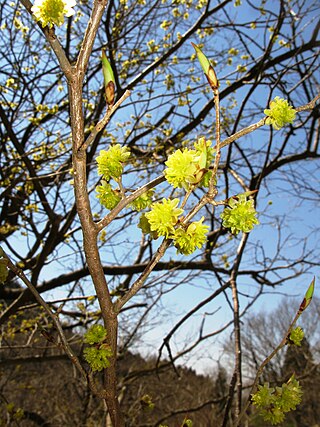
Lindera praecox, the February spicebush, is a species of flowering plant in the family Lauraceae, native to southern China, and Japan. A deciduous shrub typically 4.5 to 7.5 m tall, it is hardy to USDA Zone 8. In the wild it is found in thickets on the slopes of hills and mountains, and on the banks of streams and lakes. It is occasionally available from specialty nurseries.


















